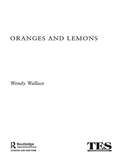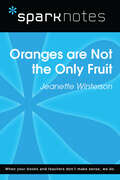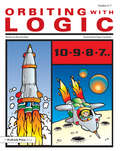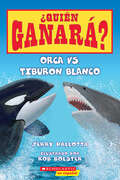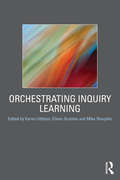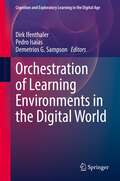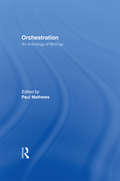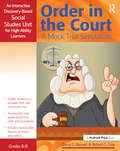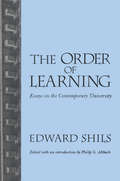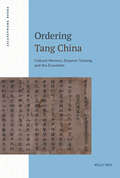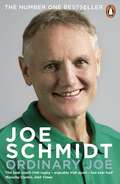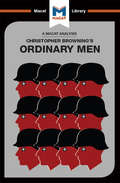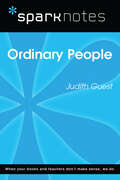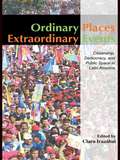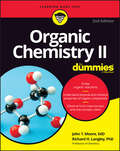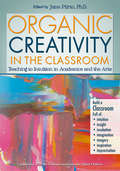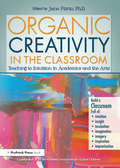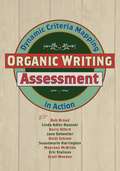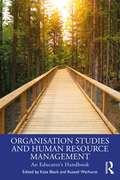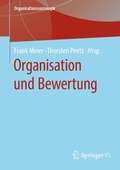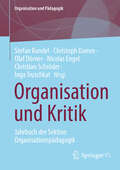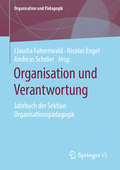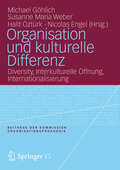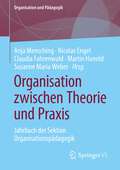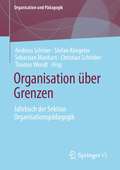- Table View
- List View
Oranges and Lemons: Life in an Inner City Primary School
by Wendy WallaceThis warts-and-all look inside an inner city primary school is an intimate and charming account of how people at Edith Neville primary school approach issues that face urban schools everywhere. The author's insightful journalistic eye focuses on how individuals cope with government initiatives, the needs of the pupils and the community at large. Focusing on the progress of individual children, in some cases from the time they start nursery, this book illuminates contemporary urban school life and provides a human account of major and minor successes, and failures, over a twelve-month period in a passionate but complex educational community. The book highlights how: the school community works to give equal chances to all children staff strive to include children with special needs the school community enlist the support of parents who mistrust the system staff manage distressed and distressing behaviour. In the background the school's managers endeavour to meet targets and inspections, while containing teacher stress and retaining a vision of the broader purpose of education.
Oranges are Not the Only Fruit (SparkNotes Literature Guide Series)
by SparkNotesOranges are Not the Only Fruit (SparkNotes Literature Guide) by Jeanette Winterson Making the reading experience fun! Created by Harvard students for students everywhere, SparkNotes is a new breed of study guide: smarter, better, faster.Geared to what today's students need to know, SparkNotes provides:*Chapter-by-chapter analysis *Explanations of key themes, motifs, and symbols *A review quiz and essay topicsLively and accessible, these guides are perfect for late-night studying and writing papers
Orbiting With Logic: Grades 5-7
by Bonnie L. RisbyThis classic series will excite students' imaginations while enriching skills in logical thinking. Orbiting With Logic problems are easy to incorporate into lesson plans and are formatted to enhance the fullest spectrum of curriculum areas while sharpening thinking skills. Challenging and instructional, these thought-provoking books present sequential exercises in logical reasoning that include relationships, analogies, syllogisms, sequences, deductive reasoning, inference, truth-values, and logical notation. Simple grids coupled with intriguing problems evoke enthusiasm and inspire students to higher and higher levels of thinking. Each book builds on concepts presented previously in the series to offer a comprehensive logic adventure for young thinkers.The skills students build by using this book are applicable to several areas of the curriculum. Academic skills used in reading, math, writing, and science all depend on the ability to perceive and define relationships, sequence events, and form inferences. But, beyond the academic world, students will find logical thinking an integral part of everyday life.This is the last in a three-book series designed to sharpen children's thinking skills. Students will be ready for this book once they have mastered Logic Countdown and Logic Liftoff.Grades 5-7
Orca vs. Tiburón blanco (¿Quién ganará?)
by Jerry PallottaWhat would happen if a great white shark and a killer whale met each other? What if they had a fight? Who do you think would win?Este lector de no-ficción compara y contrasta dos feroces criaturas submarinas. Los pequeños aprenderán sobre la anatomía, el comportamiento y más de la orca y el tiburón blanco. Este libro está lleno de fotos, gráficos, ilustraciones y datos increíbles.This nonfiction reader compares and contrasts two ferocious underwater creatures. Kids learn about the killer whale and the great white shark's anatomies, behaviors, and more. This book is packed with photos, charts, illustrations, and amazing facts.
Orchestrating Inquiry Learning
by Mike Sharples Karen Littleton Eileen ScanlonThere is currently a rapidly growing interest in inquiry learning and an emerging consensus among researchers that, particularly when supported by technology, it can be a significant vehicle for developing higher order thinking skills. Inquiry learning methods also offer learners meaningful and productive approaches to the development of their knowledge of the world, yet such methods can present significant challenges for teachers and students. Orchestrating Inquiry Learning addresses the key challenge of how to resource and support processes of inquiry learning within and beyond the classroom. It argues that technological support, when coupled with appropriate design of activities and management of the learning environment, can enable inquiry learning experiences that are engaging, authentic and personally relevant. This edited collection of carefully integrated chapters brings together, for the first time; work on inquiry learning and orchestration of learning. Drawing upon a broad range of theoretical perspectives, this book examines: Orchestration of inquiry learning and instruction Trajectories of inquiry learning Designing for inquiry learning Scripting personal inquiry Collaborative and collective inquiry learning Assessment of inquiry learning Inquiry learning in formal and semi-formal educational contexts Orchestrating Inquiry Learning is essential reading for all those concerned with understanding and promoting effective inquiry learning. The book is aimed at an international audience of researchers, post-graduate students, and advanced undergraduates in education, educational technology and psychology. It will also be of interest to educational practitioners and policy makers, including teachers, educational advisors, teacher-students and their trainers.
Orchestration of Learning Environments in the Digital World (Cognition and Exploratory Learning in the Digital Age)
by Dirk Ifenthaler Demetrios G. Sampson Pedro IsaíasThis volume focuses on the implications of digital technologies for educators and educational decision makers that are not widely represented in the literature. The chapters contained in the volume are based on the presentations at the 2020 edition of the CELDA conference and cover multiple developments in the field such as deploying learning technologies, proposing pedagogical approaches and practices to address digital transformation, and presenting case studies of specific technologies and contexts. The chapters form a lively debate and provide a comprehensive analysis of the contribution of learning technologies designed to improve the learning process and the experience of the students as well as to develop key competences.
Orchestration: An Anthology of Writings
by Paul MathewsOrchestration: An Anthology of Writings is designed to be a primary or ancillary text for college-level music majors. Although there are several 'how to' textbooks aimed at this market, there is little available that traces the history of orchestration through the writings of composers themselves. By collecting writings from the ninenteenth century to today, Mathews illuminates how orchestration has grown and developed, as well as presenting a wide variety of theories that have been embraced by the leading practitioners in the field. The collection then traces the history of orchestration, beginning with Beethoven's Orchestra (with writings by Berlioz, Wagner, Gounod, Mahler, and others), the 19th century (Mahler, Gevaert, Strauss) the fin de siecle (on the edge of musical modernism; writings by Berlioz, Jadassohn, Delius, and Rimsky Korsakov), early modern (Busoni, Schoenberg, Stravinsky, Grainger, and others), and high modern (Carter, Feldman, Reich, Brant). Many of these pieces have never been translated into English before; some only appeared in small journals or the popular press and have never appeared in a book; and none have ever been collected in one place. The study of orchestration is a key part of all students of music theory and composition. Orchestration provides a much needed resource for these students, filling a gap in the literature.
Order in the Court: A Mock Trial Simulation, An Interactive Discovery-Based Social Studies Unit for High-Ability Learners (Grades 6-8)
by Richard Cote Darcy BlauveltThis book is part of the Interactive Discovery-Based Units for High-Ability Learners series, for grades 6-8, which provides teachers with opportunities to use exciting and challenging units in their classrooms. Order in the Court: A Mock Trial Simulation gives students the opportunity to conduct a trial based on a classic fairytale in order to develop their courtroom skills. After developing the necessary vocabulary, students participate in the trial of Ms. Petunia Pig v. Mr. B. B. Wolf. Students not only learn the concepts, but they also learn valuable teamwork and time management skills. The unit culminates in a full mock-trial enactment.Grades 6-8
Order of Learning: Essays on the Contemporary University
by Edward ShilsThe Order of Learning considers the problems facing higher education by focusing on main underlying factors: the relationship of higher education to government, academic freedom, and the responsibilities of the academic profession, among others. Edward Shils argues that higher education has a central role in society, and that distractions, such as pressures from government, disinterest of students and faculty in education, and involvement of institutions of higher learning in social questions, have damaged higher education by deflecting it from its commitment to teaching, learning, and research.Shils believes that the modern university must be steadfast in its commitment to the pursuit of truth, the education of students, and the provision of research. Universities should not be all things to all people. On one hand, the academic community must understand the essential mission of the university and resist distractions. On the other, government must provide the necessary support to higher education, even when the immediate "pay-off" is not self-evident.This book provides a refreshing new perspective precisely by taking a traditional stance on the role of higher education in modern society. It includes carefully researched and elegantly written essays on many of the central issues facing education today. This work will be of great interest to educators and students alike, as well as those interested in the future of higher education in the United States.
Ordering Tang China: Cultural Memory, Emperor Taizong, and the Essentials (ASIANetwork Books)
by Kelly NgoIn Ordering Tang China: Cultural Memory, Emperor Taizong and the Essentials, Kelly Ngo presents the first book-length study in English of the Essentials for Bringing about Order from Assembled Texts (Qunshu zhiyao 群書治要), a rulership anthology that became renowned for its model of governance in ancient and early modern East Asia. The Essentials is one of the earliest Chinese anthologies designed to educate rulers in cultivating an ethical character and governing the state. Commissioned for the Tang emperor Taizong in the 620s, the Essentials articulates a distinctive political philosophy through a collection of excerpts from earlier canonical, historical, and masters writings, and their commentaries. Examining the Essentials and its transmission in China, Japan, Korea, and Vietnam through the lens of cultural memory, Ngo explores the foundation, conduct, and impact of Zhenguan rulership, which became synonymous with good governance among later generations of ruling elites, scholars, and historians in China and beyond. By connecting the textual discourse with an analysis of its use and reception across the region, Ngo demonstrates that the Essentials was a key source of Confucian political thought and practice during the early Tang dynasty. In accounting for the place of the Essentials in political advice literature, Ngo illustrates how it drew from the ancient Confucian heritage and was still responsive to contemporaneous political concerns, suggesting that the Essentials played a part in the success of Zhenguan political practice. Ordering Tang China also includes the first English-language translations of portions of the seventh-century anthology, with reference to partial translations published in nine languages. Utilizing the theory of cultural memory to study the Essentials not only opens a fresh approach to learning about the imperial consumption of literature, as well as the theory and practice of emperorship, but also offers a case study for how to study Chinese governance literature, including its “mirror for princes” genre.
Ordinary Joe
by Joe Schmidt'He's a great coach. He lives and breathes the game. There's nothing he doesn't know' Brian O'Driscoll'The best coach Irish rugby - arguably Irish sport - has ever had' Malachy Clerkin, Irish TimesIn the autumn of 2010, a little-known New Zealander called Joe Schmidt took over as head coach at Leinster. He had never been in charge of a professional team. After Leinster lost three of their first four games, a prominent Irish rugby pundit speculated that Schmidt had 'lost the dressing room'.Nine years on, Joe Schmidt has stepped down as Ireland coach having achieved success on a scale never before seen in Irish rugby. Two Heineken Cups in three seasons with Leinster. Three Six Nations championships in six seasons with Ireland, including the Grand Slam in 2018. And a host of firsts: the first Irish victory in South Africa; the first Irish defeat of the All Blacks, and then a second; and Ireland's first number 1 world ranking.Along the way, Schmidt became a byword for precision and focus in coaching, remarkable attention to detail and the highest of standards. But who is Joe Schmidt? In Ordinary Joe, Schmidt tells the story of his life and influences: the experiences and management ideas that made him the coach, and the man, that he is today. And his diaries of the 2018 Grand Slam and the 2019 Rugby World Cup provide a brilliantly intimate insight into the stresses and joys of coaching a national team in victory and defeat.From the small towns in New Zealand's North Island where he played barefoot rugby and jostled around the dinner table with seven siblings, to the training grounds and video rooms where he consistently kept his teams a step ahead of the opposition, Ordinary Joe reveals an ordinary man who has helped his teams to achieve extraordinary things.'Rugby obsessives and amateur coaches will revel in the insight that Schmidt offers into his training methods, tactics and preparation ... Full of insight, emotion and considered analysis' Irish Daily Mail'An insight into the fascinating personality of the man who has been the single most influential figure in Irish rugby over the last decade' Irish Times'He is clearly more than an ordinary coach, the winning of two Heinekens, beating New Zealand twice, the 2018 Grand Slam and reaching no.1 in the World Rankings are positive brushstrokes, marking Irish rugby for ever ... A rocky read about exceptional deeds, told in extraordinary fashion' Irish Daily Star'Undoubtedly the greatest coach in Irish rugby history' Daily Telegraph
Ordinary Men: Reserve Police Battalion 101 and the Final Solution in Poland
by Tom Stammers James ChappelOf all the controversies facing historians today, few are more divisive or more important than the question of how the Holocaust was possible. What led thousands of Germans – many of them middle-aged reservists with, apparently, little Nazi zeal – to willingly commit acts of genocide? Was it ideology? Was there something rotten in the German soul? Or was it – as Christopher Browning argues in this highly influential book – more a matter of conformity, a response to intolerable social and psychological pressure? Ordinary Men is a microhistory, the detailed study of a single unit in the Nazi killing machine. Browning evaluates a wide range of evidence to seek to explain the actions of the "ordinary men" who made up reserve Police Battalion 101, taking advantage of the wide range of resources prepared in the early 1960s for a proposed war crimes trial. He concludes that his subjects were not "evil;" rather, their actions are best explained by a desire to be part of a team, not to shirk responsibility that would otherwise fall on the shoulders of comrades, and a willingness to obey authority. Browning's ability to explore the strengths and weaknesses of arguments – both the survivors' and other historians' – is what sets his work apart from other studies that have attempted to get to the root of the motivations for the Holocaust, and it is also what marks Ordinary Men as one of the most important works of its generation.
Ordinary People (SparkNotes Literature Guide Series)
by SparkNotesOrdinary People (SparkNotes Literature Guide) by Judith Guest Making the reading experience fun! Created by Harvard students for students everywhere, SparkNotes is a new breed of study guide: smarter, better, faster. Geared to what today's students need to know, SparkNotes provides: *Chapter-by-chapter analysis *Explanations of key themes, motifs, and symbols *A review quiz and essay topicsLively and accessible, these guides are perfect for late-night studying and writing papers
Ordinary Places/Extraordinary Events: Citizenship, Democracy and Public Space in Latin America (Planning, History and Environment Series)
by Clara IrazábalClara Irazábal and her contributors explore the urban history of some of Latin America’s great cities through studies of their public spaces and what has taken place there. The avenues and plazas of Mexico City, Havana, Santo Domingo, Caracas, Bogotaì, SaÞo Paulo, Lima, Santiago, and Buenos Aires have been the backdrop for extraordinary, history-making events. While some argue that public spaces are a prerequisite for the expression, representation and reinforcement of democracy, they can equally be used in the pursuit of totalitarianism. Indeed, public spaces, in both the past and present, have been the site for the contestation by ordinary people of various stances on democracy and citizenship. By exploring the use and meaning of public spaces in Latin American cities, this book sheds light on contemporary definitions of citizenship and democracy in the Americas.
Organic Chemistry II For Dummies
by John T. Moore Richard H. LangleyWith Dummies at your side, you can conquer O-chem Organic chemistry is, well, tough. With Organic Chemistry II For Dummies, you can (and will!) succeed at one of the most difficult college courses you’ll encounter. We make the subject less daunting in the second semester, with a helpful review of what you learned in Organic Chemistry I, clear descriptions of organic reactions, hints for working with synthesis and roadmaps, and beyond. You’ll love the straightforward, effective way we explain advanced O-chem material. This updated edition is packed with new practice problems, fresh examples, and updated exercises to help you learn quickly. Observe from a macroscopic and microscopic view, understand the properties of organic compounds, get an overview of carbonyl group basics, and everything else you’ll need to pass the class. Organic Chemistry II For Dummies is packed with tips to help you boost your exam scores, stay on track with assignments, and navigate advanced topics with confidence. Brush up on concepts from Organic Chemistry I Understand the properties of organic compounds Access exercises and practice questions to hone your knowledge Improve your grade in the second semester of Organic ChemistryOrganic Chemistry II For Dummies is for students who want a reference that explains concepts and terms more simply. It’s also a perfect refresher O-chem veterans preparing for the MCAT.
Organic Creativity in the Classroom: Teaching to Intuition in Academics and the Arts
by Jane PiirtoOrganic Creativity in the Classroom demonstrates an approach to teaching creatively-teaching to intuition-that is written by experienced, award-winning classroom teachers. Instead of focusing on divergent production skills such as fluency and flexibility, an outdated approach that dominates the field of creativity studies, this book includes helpful strategies that can be used to encourage students to become more creative within a specific domain. Teachers of writing, mathematics, science, social science, literature, foreign language, theater, songwriting, psychology, comparative religion, and arts education, among other domains, who infuse creativity and intuition into their classrooms share their practical advice using an insightful storytelling approach.
Organic Creativity in the Classroom: Teaching to Intuition in Academics and the Arts
by Jane PiirtoCreativity can be taught and nurtured, and we can build classrooms in which creativity thrives. This philosophy acts as a central thesis in a new book, Organic Creativity in the Classroom, edited by award-winning author Jane Piirto, Ph.D.This innovative collection of essays explores approaches to teaching creativity from the perspective of experienced educators and artists. The 23 authors have taught for more than 500 years combined, and in this book they share teaching stories and helpful strategies that can be used to encourage students to become more creative within specific domains. The authors include master teachers, curriculum theorists, holistic educators, and award-winning practitioners of writing, mathematics, science, social science, literature, foreign language, theater, songwriting, dance, music, and arts education, among other domains, who incorporate creativity and intuition into their classrooms. In this readable and lively book, they share their personal stories and practical advice for infusing creativity into the lives of students.
Organic Writing Assessment: Dynamic Criteria Mapping in Action
by Linda Adler-Kassner Bob Broad Maureen McBride Barry Alford Jane Detweiler Heidi Estrem Susanmarie Harrington Eric Stalions Scott WeedenEducators strive to create “assessment cultures” in which they integrate evaluation into teaching and learning and match assessment methods with best instructional practice. But how do teachers and administrators discover and negotiate the values that underlie their evaluations? Bob Broad’s 2003 volume, What We Really Value, introduced dynamic criteria mapping (DCM) as a method for eliciting locally-informed, context-sensitive criteria for writing assessments. The impact of DCM on assessment practice is beginning to emerge as more and more writing departments and programs adopt, adapt, or experiment with DCM approaches. For the authors of Organic Writing Assessment, the DCM experience provided not only an authentic assessment of their own programs, but a nuanced language through which they can converse in the always vexing, potentially divisive realm of assessment theory and practice. Of equal interest are the adaptations these writers invented for Broad’s original process, to make DCM even more responsive to local needs and exigencies. Organic Writing Assessment represents an important step in the evolution of writing assessment in higher education. This volume documents the second generation of an assessment model that is regarded as scrupulously consistent with current theory; it shows DCM’s flexibility, and presents an informed discussion of its limits and its potentials.
Organisation Studies and Human Resource Management: An Educator's Handbook
by Kate BlackThis book advances educational understanding and practice in Organisation Studies and Human Resource Management (OSHRM). It develops new theoretical perspectives on learning in OSHRM and introduces and evaluates a range of educational approaches, methods and techniques to advance teaching and assessment and student learning in the field. Chapters are evidence-based and provide practical advice for enhancing the effectiveness of OSHRM programmes and courses in universities, colleges and human resource development settings globally. With contributions from leading educators in OSHRM, the book both advances understanding and provides practical guidance for the design of programmes, courses and classes. Importantly, it illustrates innovative classroom and virtual learning experiences that will secure student engagement; cultivate critical and creative thinking; and enhance students’ employability, leadership and enterprise capabilities. A distinctive contribution of the book lies in the inclusion of student viewpoints on the understandings and educational advances proposed by the authors. Significantly, the book demonstrates how recent changes affecting higher education, such as globalisation, mass participation and marketisation, and, most recently, the pandemic crisis, can be embraced as opportunities to advance both educational understanding and educational policy and practice in OSHRM. This book will be invaluable for university educators internationally in the fields of OSHRM and for HR developers working in management and leadership development, and the book has relevance to both groups whatever their career stage, from absolute beginners through to advanced practitioners.
Organisation und Bewertung (Organisationssoziologie)
by Frank Meier Thorsten PeetzOrganisationen spielen für viele Bewertungsprozesse eine entscheidende, aber oft übersehene Rolle: Sie geben den Kontext ab, in dem Bewertungen vollzogen werden, sie produzieren und kommunizieren Bewertungen und werden schließlich auch selbst regelmäßig bewertet, evaluiert, geratet und gerankt. Die Beiträge des Bandes verknüpfen systematisch Ansätze aus Organisationsforschung und Valuation Studies und eröffnen dadurch einen dezidiert organisationssoziologischen Blick auf Phänomene des Bewertens, Vermessens, Kategorisierens und Vergleichens in, von und durch Organisationen.
Organisation und Kritik: Jahrbuch der Sektion Organisationspädagogik (Organisation und Pädagogik #39)
by Nicolas Engel Inga Truschkat Christian Schröder Christoph Damm Stefan Rundel Olaf DörnerDer Band versammelt theoriesystematische und empirische Beiträge, die das Verhältnis zwischen organisationalem Lernen und Kritik unter gesellschaftlichen und pädagogischen Bedingungen diskutieren. Eine wachsende Aufmerksamkeit für die Auseinandersetzung mit Kritik in der Organisationspädagogik begründet sich in der organisationspädagogischen Wissensproduktion mit Blick auf aktuelle gesellschaftliche Krisen und Herausforderungen, die zu einer hinterfragenden, sich positionierenden und einmischenden Haltung auffordern.
Organisation und Verantwortung: Jahrbuch der Sektion Organisationspädagogik (Organisation und Pädagogik #27)
by Nicolas Engel Andreas Schröer Claudia FahrenwaldDas Jahrbuch möchte in theoretischer, empirischer und pragmatischer Perspektive zur Klärung einer (organisations-)pädagogischen Verhältnisbestimmung von Organisation und Verantwortung beitragen. Im Rekurs auf die internationale und interdisziplinäre Diskussion zum Begriff der Verantwortung in seiner ethischen, gesellschaftlichen, politischen und pädagogischen Dimension werden organisationstheoretische Fragen und organisationspädagogische Heraus-forderungen bearbeitet. Die Beiträge beschäftigen sich mit dem Thema im Hinblick auf Rolle, Funktion(en) und Bedeutung von Verantwortung in, von und zwischen Organisationen als zentrale Träger des kulturellen und gesellschaftlichen Wandels. Über das Schwerpunktthema hinaus enthält das Buch weitere Beiträge zu aktuellen organisationspädagogischen Fragestellungen.
Organisation und kulturelle Differenz
by Susanne Maria Weber Nicolas Engel Michael Göhlich Halit ÖztürkIm Zuge von Migration, Europäisierung und Globalisierung ist kulturelle Differenz zu einer Bedingung organisationaler Praxis geworden, die als Aufgabe und Ressource organisationaler und individueller Entwicklung bzw. Weiterbildung verstanden und genutzt werden kann. Die Beiträge des vorliegenden Bandes untersuchen den Zusammenhang von Organisation und kultureller Differenz aus pädagogischer Sicht. Neben theoretischen Beiträgen werden empirische Studien zu Diversity bzw. Diversity Management, Interkultureller Öffnung und Internationalisierung vorgestellt. Als Fallbeispiele dienen Betriebe, Schulen, Kultureinrichtungen und andere Organisationen.
Organisation zwischen Theorie und Praxis: Jahrbuch der Sektion Organisationspädagogik (Organisation und Pädagogik #32)
by Susanne Maria Weber Nicolas Engel Martin Hunold Claudia Fahrenwald Anja MenschingDas Buch untersucht Organisationen aus theoretischer, empirischer und praxisbezogener Perspektive – vor allem mit Blick auf das Wechselspiel zwischen diesen drei Zugängen. Jenseits eines dichotomen Verhältnisses der Begriffe ‚Theorie‘ und ‚Praxis‘ können dabei die komplexen Relationen, Ambivalenzen und Widersprüche in Bezug auf die Theorie und Praxis von Organisationen thematisiert und Chancen und Optionen neuer Theorie-Praxis-Relationierungen aus organisationspädagogischer Perspektive ausgelotet werden.
Organisation über Grenzen: Jahrbuch der Sektion Organisationspädagogik (Organisation und Pädagogik #29)
by Stefan Köngeter Andreas Schröer Christian Schröder Thomas Wendt Sebastian ManhartDas Jahrbuch versammelt 18 Beiträge, in denen die grundlegende Bedeutung von Grenzbildungen und Grenzziehungen für Organisationen und für die Theorie und Praxis der Organisationspädagogik herausgearbeitet wird. Die Beiträge beobachten, analysieren und untersuchen Grenzen, die von und durch Organisationen, aber auch durch organisationspädagogische Praxen gezogen, überschritten und aufgelöst werden. Das Bedingungsverhältnis von Grenzziehung und Grenzüberschreitung sowie die sich dabei konstituierenden Grenzobjekte und -praxen werden in begrifflich-theoretisch ausgerichteten Arbeiten wie auch in empirischen Untersuchungen systematisch reflektiert. Damit trägt der Band zur Klärung des Verhältnisses von Organisation und Grenze und zur weiteren Konturierung der spezifischen Perspektive der Organisationspädagogik bei. Über das Schwerpunktthema hinaus enthält das Jahrbuch zwei weitere Beiträge aus der aktuellen organisationspädagogischen Forschung.
